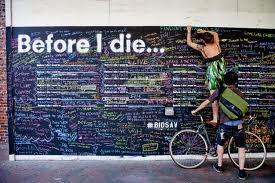
Karen Kring
Candy Chang at MPC's Dec. 10 Think and Drink
MPC’s latest Urban Think and Drink event inspired us to think bigger about the power of public spaces and public engagement. As we aspire to regional excellence, policy change, world class transit systems and other urban harmonies, we can miss the forest for the trees. It is easy to relegate the people and communities that we seek to impact to simple beneficiaries; instead of relying on them as vehicles to develop ideas and solutions to our urban issues, we are often drawn to complex frameworks that can miss the serendipity that should be a part of planning.
Artist Candy Chang was the featured speaker at our Dec. 10 Urban Think and Drink, an event that invites urban-issue-oriented thinkers to speak about the impact of their craft on urban planning and development. Chang’s work reminds us of the power of public spaces and assemblies of people to inspire radical and beneficial change. How do we engage with our public spaces when trying to revive them? Do we speak to them, at them or with them? When we gather people for public comment, what tools do we offer them to engage in the discussion? Chang walked a capacity crowd through her far-ranging projects to show how her nontraditional approaches to these questions have yielded outcomes that are nothing short of magical.

Before I Die... wall in Savannah, Georgia, USA
Candy Chang
One example of this magic can be found in her project entitled Before I Die… which started as an exercise in completing that phrase on a public wall and has grown to become a global movement.
Her work inspires me to think about how these practices can enhance our Placemaking work, particularly as we gear up for another exciting contest in 2014. Our 2013 Placemaking contest, Activate Union Station, pushed MPC and Union Station staff and visitors to think about and experience the spaces in a whole new way, generating new and exciting electricity for the spaces involved. The 2013 contest reaffirmed that Chicago values and understands Placemaking, both as producers and consumers. Our 2014 contest will aspire to offer participants and visitors more tools to engage with public spaces and each other. This kind of assembly of people, with the potential for conversation and a focal point, is quite the spark; planners, advocates and regional agencies must be creative to ensure that the spark doesn’t fizzle.
The Chicago region certainly has myriad opportunities to reimagine public spaces as a springboard for public discussions or tools for public engagement. Take for example the recent vacancies of Chicago Public School buildings, the city’s clusters of underused parcels of land, beautiful (but inactive) stretches of riverfront and the issue of public safety. Candy Chang reminds us that the gathering of people for thoughtful discussions on these topics and countless others can be marvelous unto themselves. Chang’s collaborative idea website, Neighborland.com, demonstrates the power that place-based conversations can have to create new community synergies.
Candy Chang reminded us that, like famed farmer turned architect Joseph Paxton, we can think big by starting small. With MPC pursuing so many community-oriented and place-based initiatives, it’s great to be reminded that success can grow out of simplicity. MPC hopes to continue to produce nourishing and contemplative public engagement experiences that will inspire people across our region to reflect upon, support and further our mission to produce innovative, pragmatic solutions to planning and development challenges in Chicagoland.